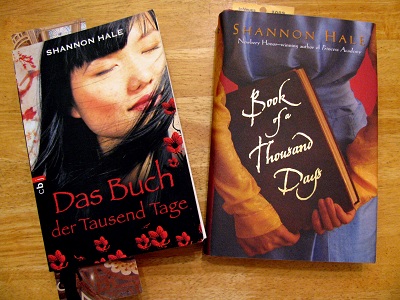It’s time for Sonderling Sunday, that time of the week when I play with language by looking at the German translation of children’s books!
Okay, it’s a little late for it tonight, but hey, it’s Daylight Savings Time, so my body doesn’t realize that I should be tired. I’ll try for a short one.
And it’s time to go back to one of my favorite English books, Book of a Thousand Days, by Shannon Hale, >Das Buch der Tausend Tage, with the so gorgeous German cover.
Last time (which I can’t believe was a year ago!), I left off before Day 32, which starts on page 31 in the English edition, and Seite 42 in the German edition.
Right away, there’s something that’s more easily said in English:
“whisper-shouting”
= flüsterte und rief zur gleichen Zeit
(“whispered and shouted at the same time”)
This is fun in German:
“mending a stocking” = stopfte einen Strumpf
It’s interesting when onomatopoeia is done so differently, but it works:
“Rap, rap, rap” = Tack, tack, tack.
“rotten” = abscheulich
“palms” = Handflächen (“Hand surfaces”)
“wooden spoon” = Holzlöffel
“puddle of moonlight” = Lache Mondlicht
“double stitched” = doppelt genähtem
“I knew he was teasing me” = ich wusste, dass er mich nur neckte
“friendly insult” = wohlgesonnene Beleidigung (Google: “sympathetic insult”)
“sturdy ankles” = stramme Knöchel
“slippers” = Pantoffeln
“the kind with the toe curled up prettily”
= solche mit einer hübsch gebogenen Spitze
(“such with a pretty bowed tip”)
“metal catch” = Eisenhaken
“pine bough” = Tannenzweig
“winter nap” = Winterschlummer
“Midwinter” = Wintersonnenwende (“winter-sun-turn”)
“to feast until it hurts” = zu prassen, bis es wehtut
“felt tents” = Filzjurten
“blotchy face” = fleckiges Gesicht
“browned and callused hands” = braunen schwieligen Hände
“barrel of water” = Wasserfass
“silliest song” = albernste Lied
“bodiless piglet” = Ferkel ohne Körper
“Happily snuffling” = Fröhlich schnüffelts
“grumble” = nörgeln
“brush” (for writing) = Pinsel (Ah! I just learned where the word “pencil” came from.)
“wistful” = wehmütig
“twisting and floating” = zuckend und schwebend
And that’s all for tonight! I finished Day 32.
But what useful things we’ve learned! After all, who would want to travel in Germany without knowing how to say “bodiless piglet”?

(I think I first read this on the iPad, which somehow can’t sort out commenting, and I just remembered to come back to it.) I loved this book (in English – I haven’t seen it in German), and was especially excited to see a fantasy treatment of Mongolian culture. I’m especially fascinated here that the German comes right out and calls the tents the Mongolian (or westernized Mongolian) “felt yurts” instead of generic “felt tents” of the original, which would be “Filzzelten”. “Wintersonnenwende” and “schwieligen” are both new words for me, too!
That *is* interesting. Yes, it’s interesting how the vocabulary of the translators is different. I always wonder how much has to do with the translator and how much to do with the material being translated.
I love that you’re following Sonderling Sunday, Katy! Don’t totally trust my German, of course! (Though I *mostly* stick with what the translator did.)
Well… I think you spent longer in Germany than I did, and it’s been almost 20 years since I’ve been myself, so I don’t know that my German is so accurate, either. Having the German copy directly from Shannon Hale is *seriously* cool!
Oh, yes, indeed, it was seriously cool! http://sonderbooks.com/blog/?p=13436
I was *so* jazzed about it. If I weren’t already crazy about Shannon Hale — as a person as well as as an author, that probably would have done it. 🙂
Oh, and forgive me if I brag. Shannon Hale posted about having this German translation. I begged nicely — and she sent me a copy for Sonderling Sunday! 🙂 If I *ever* finish Seltsamer Sonderlinge, this will be the one I come back to every other week.